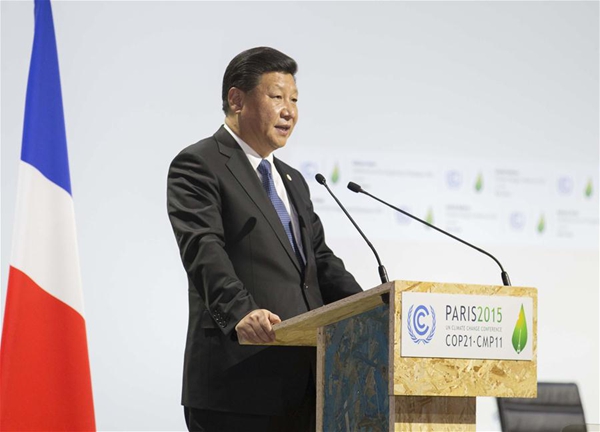Slowdown momentum: China's environmental development
- By Kyle Calandra
 0 Comment(s)
0 Comment(s) Print
Print E-mail China.org.cn, December 4, 2015
E-mail China.org.cn, December 4, 2015
From the corner of a little dumpling restaurant, a short walk away from the Forbidden City, television glare cuts a beacon through Beijing's dark, polluted air. Scenes of Chinese President Xi Jinping speaking at the 2015 United Nations Climate Change Conference go unnoticed by the restaurant's patrons seeking sanctuary from the smog.
"China will adopt new policy measures to build low-carbon systems, develop green construction strategies and establish a nationwide carbon-emission trading market to foster a new pattern of modernization featuring harmony between man and nature," said the Chinese president in Paris on Monday.
|
|
|
Chinese President Xi Jinping delivers a speech at the opening ceremony of the United Nations (UN) climate change conference in Paris, France, Nov. 30, 2015. [Xinhua] |
Xi's endearing rhetoric of environmentally conscious development seemed to stand in stark contrast to China's recent national realities. From 2000 to 2005, the growth rate of the country's CO2 emissions doubled, rising to an astonishing 10.6 percent, setting a national precedent as China's emissions equaled those of the United States. Today, China is the world's leading CO2 emitter with estimated annual emissions accounting for roughly 30 percent of the global total – twice as much as the United States.
During his speech in Paris, Beijing's usually raucous residential streets were empty, haunted by the enveloping haze. Pollution levels in the city triggered the Beijing Environmental Protection Bureau to raise the pollution indicator to "orange," the second highest warning classification.
Just down the way from the little dumpling restaurant, a valet working for a posh bistro in one of the city's famous alleyways wades staidly through the smog. "It's a little bit unbelievable," he laughs, struggling to describe the scene, "but what can you do?" He shrugs and his friend lights a cigarette.
Considering China's environmental reality in recent years, it's unsurprising that many people seem indifferent. However, Chinese President Xi Jinping reassured attendees of the Paris Climate Conference that "the world's second largest economy has the confidence and resolve to walk its words."
Beyond the veneer of China's rhetoric, there are signs that the country's emissions growth rate is beginning to stall. According to a report by the PBL Netherlands Environmental Assessment Agency, preliminary 2015 statistics of key indicators such as the production of electricity, steel and cement (major contributing elements of CO2 emissions) all show zero or negative growth rates.
In the report, the slowdown of the growth in China's CO2 emissions is attributed to structural changes in China's economy towards a less energy-intensive service sector and high value-added manufacturing industry that is more focused on sustainable domestic consumption, highlighting energy efficiency and a low-carbon energy mix as intended current and future trends.
At the Asia Pacific Economic Cooperation (APEC) Summit in November of last year, China announced a historic agreement with the United States focused on curbing emissions and tackling climate change. According to Emily Rauhala at TIME, the deal included new targets for the U.S. and China's landmark commitment to halt emissions growth, with the broader goal being to "inject momentum" into efforts to negotiate a new global pact on emissions at this year's Paris Climate Conference.
On the back of these efforts, China submitted an action plan to the United Nations Framework Convention on Climate Change (UNFCCC) in June, promising to reduce its carbon emissions per unit of GDP by 60-65 percent from 2005 measurements and peak its carbon emissions by 2030.
Chinese policymakers seem determined to maintain the momentum of a continued emissions growth slowdown, working to change the current national reality within the country and shift the mentality of indifference to one of intent.
China's newly proposed national blueprint, the 13th Five Year Plan (2016-2020), is aimed at creating an "ecological civilization" which would foster sustainable, balanced growth while implementing policies of clean industrial production, low-carbon development and energy conservation throughout the country's medium and long term development.
According to Xi, acting on climate change is driven by China's domestic needs for sustainable development, but also by its sense of responsibility to fully engage in global governance, asserting that "the Paris conference is not the finish line, but a new starting point."
With a long winter ahead, the caustic pollution that descends almost daily on the city seems to have settled in Beijing for the immediate future. However, recent development policies have kindled the country's environmental consciousness, moving China towards a promising vision of the future.
For Beijing's inhabitants, and the country at large, a move in almost any direction would arguably be welcome. And China, determined to "walk its words," seems ready to move forward into a sustainable 21st century.
Opinion articles reflect the views of their authors, not necessarily those of China.org.cn.




 Add your comments...
Add your comments...

